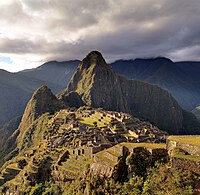
Photo from wikipedia
Abstract Social-ecological justice is an emerging field that argues for nature’s agency, social-ecological awareness, recognition of nature’s capabilities, and participation in decision-making processes. A social-ecological justice perspective lifts the analysis… Click to show full abstract
Abstract Social-ecological justice is an emerging field that argues for nature’s agency, social-ecological awareness, recognition of nature’s capabilities, and participation in decision-making processes. A social-ecological justice perspective lifts the analysis out of a distribution of environmental impacts to humans, to a recognition of social-ecological complexities. However, bringing this perspective to urban planning requires a suite of methods and tools in coordination with existing planning methods that do not address issues of social-ecological justice, or, justice for nature. Drawing from existing methods and tools, this paper presents a novel methodology to define, identify, and map social-ecological injustices in urban landscapes. Three dimensions of social-ecological justice (distribution, recognition, and participation) are operationalised into a set of indicators, which are added to create a Social-Ecological Injustices Index that identifies place hotspots. A fourth dimension, capabilities, is discussed, but not operationalised in the paper. The urban region of Melbourne, which has been undergoing intense urbanisation processes, is used as a case study to test the applicability of this index. The geospatial analysis reveals various degrees of social-ecological injustices across the Melbourne Metropolitan region and unveils the location of the most deprived areas. This methodology can be applied as a systematic and effective way for urban planners and decision-makers to identify and target social-ecological injustice hotspots as areas of prioritisation for urban regeneration with nature-based solutions.
Journal Title: Land Use Policy
Year Published: 2021
Link to full text (if available)
Share on Social Media: Sign Up to like & get
recommendations!